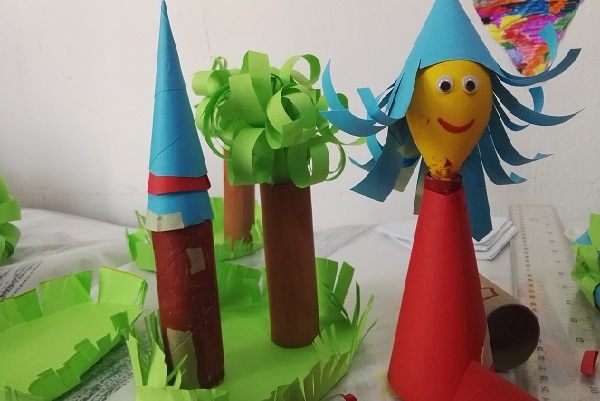 North West Balkans
North West Balkans
Languages
“The only time in my life that I feel others have accepted me for who I am”

A princess and her castle - a detail from a creative workshop with children on the move in Belgrade, Serbia. Photo by Tatjana Ristic, Save the Children.
Aicha* was born in Guinea, as the tenth child of the family, the youngest of 6 daughters. She grew up with parents who were farmers and, according to her, managed to earn only one meal per day. She is illiterate since she never attended school like her mother and sisters. Her brothers and her father are literate since they completed primary school education.
Aicha’s mother gave birth to her first child when she was only 14, and continued having children over the years – Aicha couldn’t recall exactly how many children were born in the family. On several occasions, Aicha said, a new baby would only live for several hours.
Other girls in the family, Aicha’s older sisters, were married off. As she was very small when it happened, she didn’t remain in contact with them. At the age of 17, her father told her she was to marry a man he chose for her and that her future husband would arrive within 3 days and take her with him. As she learned later, he was a 43-year-old man whose wife died shortly before the arranged marriage, and who already had six children.
Aicha told her father she did not want to marry anyone, and that she would kill herself rather than be that man’s wife. Her father beat her, saying that her husband had already paid for her, and that she was ungrateful because she refused to help her family. The girl ran away that night. She went to her aunt, and several days later she left her country with a group of young men and two girls.
Running from home and hoping for a better future, Aicha arrived at the Serbian border, where she was arrested when the police established that she was travelling with forged documents. The police also detected that she was accompanied by an elderly man who was speaking instead of her, watching over her and her documents. Aicha was wearing a wig. While searching their luggage, several forged passports of EU countries with different names and dates of birth were found. The police determined that there is a probability that Aicha is being trafficked and that she might be a survivor of sexual exploitation. She was taken away from the group and referred to Atina, the Serbian non-governmental organization with a long-standing expertise in combating human trafficking and helping the victims of trafficking for the purpose of forced labor, sexual slavery or sexual exploitation. In 2018, Save the Children has, with the help of Radio Aid, launched a project to support Atina’s anti-trafficking programmes in Serbia. Among other activities, Radio Aid supported the running of shelter for victims of human trafficking.
Aicha was accepted by Atina and accommodated in the safe house the same night she was identified.
In the shelter, Aicha finally found a safe place and support from Atina’s case managers, experienced social workers and psychologists, but also from the community of other women staying in the shelter. In the first days she was hesitant to speak and share her experiences. She complained about gynecological issues, pain and bleeding, but refused to go to the gynecologist. It took some time for the team to gain her trust and convince her to accept help. After the medical exam, Atina’s team learned that Aicha has been subjected to genital mutilation. She told them that it happened when she was 12. As she had no knowledge of practices in the rest of the world, and did not want to stand out and be ‘different’ than other girls, she was reluctant to talk about it or accept help from the doctor.
For many girls who have gone through similar, harrowing experiences, a shelter is not only a safe place where they find support, but also a place where they get a chance to, try new things, learn, be creative and enjoy, for some for the first time in their life. Staying in the shelter, Aicha was invited to go to a swimming pool together with other girls. Although this was a nice opportunity as she has never gone swimming before she first said that she was not interested. After Aicha had some time to think, she changed her mind and joined the group. The girls had a nice day at the pool.
Later, Aicha said to the Atina’s case manager: “I thought that I did not deserve the same things as other girls. I did not give myself the right to enjoy life and do something for myself. This is the only time in my life that I feel others have accepted me for who I am. To me, being accepted means being at home, and Atina will forever be my second home."